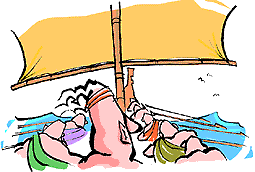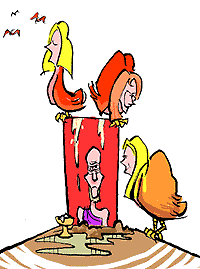
|
The Early Years Jason was the son of a king whose brother had usurped the throne. Jason's uncle, whose name was Pelias (PEL-ee-us), lived in constant fear of losing what he had taken so unjustly. He kept Jason's father a prisoner and would certainly have murdered Jason at birth. But Jason's mother deceived Pelias by mourning as if Jason had died. Meanwhile the infant was bundled off to the wilderness cave of Chiron (KYE-ron) the Centaur. This combination horse-and-man tutored Jason in the lore of plants, the hunt, and the civilized arts. When he had come of age, Jason set out like a proper hero to claim his rightful throne.
The First Test Unknowingly, Jason was to play his part in a plan hatched on lofty Mount Olympus, home of the twelve supreme gods. Hera (HEE-ruh), queen of the Olympian deities, nursed a rage against King Pelias. For Jason's uncle, the usurper king, had honored all the gods but Hera. Rashly had he begrudged the queen of heaven her due. Hera's plan was fraught with danger; it would require a true hero. To test Jason's mettle, she contrived it that he came to a raging torrent on his way to reclaim his kingdom. And on the bank was a withered old woman. Would Jason go about his business impatiently, or would he give way to her request to be ferried across the stream?
The Oracle's Warning Jason did not think twice. Taking the crone on his back, he set off into the current. And halfway across he began to stagger under her unexpected weight. For the old woman was none other than Hera in disguise. Some say that she revealed herself to Jason on the far shore; others claim that he never learned of the divine service he had performed. Jason had lost a sandal in the swift-moving stream, and this would prove significant. For an oracle had warned King Pelias, "Beware a stranger who wears but a single sandal." When Jason arrived in his home kingdom, he asserted his claim to the throne. But his uncle Pelias had no intention of giving it up, particularly to a one-shoed stranger.
The Challenge Under the guise of hospitality, he invited Jason to a banquet. And during the course of the meal, he engaged him in conversation. "You say you've got what it takes to rule a kingdom," said Pelias. "May I take it that you're fit to deal with any thorny problems that arise? For example, how would you go about getting rid of someone who was giving you a pain in the neck?" Jason considered for a moment, eager to show a kingly knack for problem solving. "Send him to barbarian Colchis (KOL-kiss) in quest of the Golden Fleece?" he suggested. "Not a bad idea," responded Pelias. "It's just the sort of quest that any hero worth his salt would leap at. Why, if he succeeded he'd be remembered down through the ages. Tell you what, why don't you go?"
The Argonauts And so it came to pass that word went out the length and breadth of Greece that Jason was looking for shipmates to embark upon a perilous but glamorous adventure. And in spite of the miniscule chances of anyone surviving to lay eyes upon the Fleece let alone get past the guarding dragon and return with the prize, large numbers of heroes were ready to run the risk. These were known as the Argonauts, after their ship, the Argo. Among them were Hercules — or Heracles (HER-a-kleez), to give him his proper Greek name — and the heroine Atalanta. Jason had the vessel constructed by the worthy shipwright Argus, who in a fit of vanity named her more or less after himself.
The Adventure Begins Argus had divine sponsorship in his task, Hera having enlisted the aid of her fellow goddess Athena. This patroness of crafts secured a prow for the vessel from timber hewn at the sacred grove of Zeus, king of the Olympian gods. This prow had the magical property of speaking — and prophesying — in a human voice. And so one bright autumn morning the Argo set out to sea, her benches crewed by lusty ranks of heroic rowers. And true to Pelias's fondest aspirations, it wasn't long before big troubles assailed the company. After stopping for better than a fortnight on an island populated exclusively by women, they put in at the kingdom of Salmydessus (sal-mih-DESS-us).
The Harpies The king welcomed them but was in no mood for festive entertainment. Because he'd offended the gods, he'd been set upon by woman-headed, bird-bodied, razor-clawed scourges known as Harpies. These Harpies were possessed of reprehensible table manners. Every evening at dinnertime, they dropped by to defecate upon the king's repast and hung around making such a racket that he would not have been able to eat had he the stomach for it. As a result, the king grew thinner by the hour. Fortunately two of Jason's crew were direct descendants of the North Wind, which gave them the power to fly. And they kindly chased the Harpies so far away that the king was never bothered again.
The Clashing Rocks In thanks, the king informed the Argonauts of a danger just ahead on the route to the Golden Fleece — two rocks called the Symplegades (sim-PLEG-uh-deez), which crashed together upon any ship passing between them. The king even suggested a mechanism by which one might avoid the effects of these Clashing Rocks. If a bird could be induced to pass between the crags first, causing them to clash together, the Argo could follow quickly behind, passing through safely before they were ready to snap shut again. By means of this device, Jason caused the rocks to spring together prematurely, nipping only the tail feathers of the bird. The Argo was able to pass between them relatively unscathed. Only her very stern was splintered.
The Flying Ram Once arrived in Colchis, Jason had to face a series of challenges meted out by King Aeetes (ee-EE-teez), ruler of this barbarian kingdom on the far edge of the heroic world. He and his people were not kindly disposed toward strangers, although on an earlier occasion he had extended hospitality to a visitor from Jason's home town. This may have been due to the newcomer's unorthodox mode of transportation. For he arrived on the back of a golden-fleeced flying ram. The stranger had been on the point of being sacrificed when the ram carried him off. Having arrived safely in Colchis, he sacrificed the ram to the gods and hung its fleece in a grove. Aeetes gave him the hand of one of his daughters in marriage.
Medea King Aeetes had taken a disliking to Jason on sight. He had no particular fondness for handsome young strangers who came traipsing into his kingdom on glorious quests featuring the trampling of his sacred grove and the carrying off of his personal property. For King Aeetes considered the Golden Fleece to be his own, and he was in the midst of telling Jason just what he could do with his precious quest when he was reminded of the obligations of hospitality by another of his daughters named Medea. Medea was motivated by more than good manners. For Hera had been looking out for Jason's interests, and she had succeeded in persuading Aphrodite (a-fro-DYE-tee), the goddess of love, to intervene on Jason's behalf.
A Farmyard Chore It was no problem at all for Aphrodite to arrange that Medea be stricken with passion for Jason the moment she first saw him. And it was a good thing for Jason that this was so. For not only was he spared a kingly tongue-lashing and a quick trip to the frontier, but Medea quietly offered to help him in his latest predicament. For once her father had calmed down, he had waxed suspiciously reasonable. Of course Jason could have the Fleece and anything else he required in furtherance of his quest — Aeetes couldn't imagine what had possessed him to be so uncooperative. All he required of Jason as a simple token of good faith was the merest of farmyard chores.
The Fire-Breathing Bulls There were two bulls standing in the adjacent pasture. If Jason would be so kind as to harness them, plow the field, sow it and reap the harvest in a single day, King Aeetes would be much obliged — and only too happy to turn over the Golden Fleece. Oh, and there was one trifling detail of which Jason should be aware. These bulls were a bit unusual in that their feet were made of brass sharp enough to rip open a man from gullet to gizzard. And then of course there was the matter of their bad breath. In point of fact, they breathed flames. Along about this juncture Jason thought he heard his mommy, Queen Polymede, calling. But then, as noted, Medea took him gently aside and suggested that she might be of aid.
Plowing and Sowing Quite conveniently for Jason, Medea was a famous sorceress, magic potions being her stock in trade. She slipped Jason a salve which, when smeared on his body, made him proof against fire and brazen hooves. And so it was that Jason boldly approached the bulls and brooked no bullish insolence. Disregarding the flames that played merrily about his shoulders and steering clear of the hooves, he forced the creatures into harness and set about plowing the field. Nor was the subsequent sowing any great chore for the now-heartened hero. Gaily strewing seed about like a nymph flinging flowers in springtime, he did not stop to note the unusual nature of the seed.
The Dragon's Teeth Aeetes, it turns out, had got his hands on some dragon's teeth with unique agricultural properties. As soon as these hit the soil they began to sprout, which was good from the point of view of Jason accomplishing his task by nightfall, but bad in terms of the harvest. For each seed germinated into a fully-armed warrior, who popped up from the ground and joined the throng now menacing poor Jason. Aeetes, meanwhile, was standing off to the side of the field chuckling quietly to himself. It irked the king somewhat to see his daughter slink across the furrows to Jason's side, but he didn't think too much of it at the time. Having proven herself polite to a fault, maybe Medea was just saying a brief and proper farewell.
Conquest of the Seed Men In actuality, she was once more engaged in saving the young hero's posterior. This time there was no traffic in magic embrocations. Medea merely gave Jason a tip in basic psychology. Jason, who it was quite clear by now lacked the heroic wherewithal to make the grade on his own, at least had the sense to recognize good advice. Employing the simple device suggested by Medea, he brought the harvest in on deadline with a minimum of personal effort. He simply threw a stone at one of the men. The man, in turn, thought his neighbor had done it. And in short order all the seed men had turned on one another with their swords until not one was left standing.
The Golden Fleece Aeetes had no choice but to make as though he'd give the Fleece to Jason, but he still had no intention of doing so. He now committed the tactical error of divulging this fact to his daughter. And Medea, still entranced by the Goddess of Love, confided in turn in Jason. Furthermore, she offered to lead him under cover of darkness to the temple grove where the Fleece was displayed, nailed to a tree and guarded by a dragon. And so at midnight they crept into the sacred precinct of Ares (AIR-eez), god of war. Jason, ever the hothead, whipped out his sword, but Medea wisely restrained his impetuosity.
The Aftermath Instead, she used a sleeping potion to subvert the monster's vigilance. Together they made off with the Fleece and escaped to the Argo. Setting sail at once, they eluded pursuit. Thus Jason succeeded in his heroic challenge. And once returned to Greece, he abandoned Medea for another princess. For though Jason had sworn to love and honor Medea for the service she had done him, he proved as fickle in this regard as he'd been unfit for single-handed questing. |

















